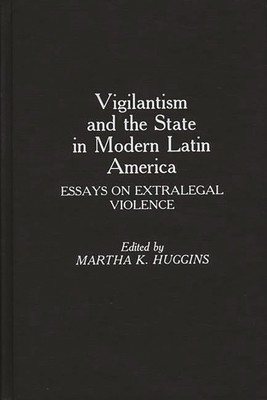
- We will send in 10–14 business days.
- Author: Martha D Huggins
- Publisher: Praeger
- ISBN-10: 0275934764
- ISBN-13: 9780275934767
- Format: 15.6 x 23.4 x 1.8 cm, hardcover
- Language: English
- SAVE -10% with code: EXTRA
Vigilantism and the State in Modern Latin America (e-book) (used book) | bookbook.eu
Reviews
Description
According to the Latin American political analysts and scholars who contributed to this volume, free elections during the 1980s largely served to disguise rather than diminish institutional repressiveness and the reality of economic, political, and social disintegration that is occurring in many Latin American countries. This book is the first work of research to deal with the violence--on the part of both states and citizens--that is the most visible expression of that breakdown.
Describing the nature and causes of Latin American vigilantism, the authors explore its impact within the larger sociopolitical system and the relationship between vigilantism and political transition. Part I is devoted to citizen violence, including mob lynchings; the work of the justiceiros (self-appointed or privately employed enforcers); and citizen uprisings against the police. Part II is a discussion of death squads in Peru, Guatemala, and Colombia and their use by the state to achieve specific social or political objectives. Part III explores the debate over violence, legislative solutions, and national security. The final section examines on-duty extra-legal police violence in several countries and the contribution of U.S. police training to state-supported terror. The authors' analyses indicate that vigilantism results from and at the same time fosters authoritarian state structures whose economic dependence on foreign powers deepens the cycle of poverty, repression, and violence. An important source of data and analysis on a largely neglected topic, this work will be of interest to a general audience concerned with human rights, to policymakers and their critics, and to scholars in the fields of criminology, comparative justice, and Latin American studies.
EXTRA 10 % discount with code: EXTRA
The promotion ends in 18d.20:53:16
The discount code is valid when purchasing from 10 €. Discounts do not stack.
- Author: Martha D Huggins
- Publisher: Praeger
- ISBN-10: 0275934764
- ISBN-13: 9780275934767
- Format: 15.6 x 23.4 x 1.8 cm, hardcover
- Language: English English
According to the Latin American political analysts and scholars who contributed to this volume, free elections during the 1980s largely served to disguise rather than diminish institutional repressiveness and the reality of economic, political, and social disintegration that is occurring in many Latin American countries. This book is the first work of research to deal with the violence--on the part of both states and citizens--that is the most visible expression of that breakdown.
Describing the nature and causes of Latin American vigilantism, the authors explore its impact within the larger sociopolitical system and the relationship between vigilantism and political transition. Part I is devoted to citizen violence, including mob lynchings; the work of the justiceiros (self-appointed or privately employed enforcers); and citizen uprisings against the police. Part II is a discussion of death squads in Peru, Guatemala, and Colombia and their use by the state to achieve specific social or political objectives. Part III explores the debate over violence, legislative solutions, and national security. The final section examines on-duty extra-legal police violence in several countries and the contribution of U.S. police training to state-supported terror. The authors' analyses indicate that vigilantism results from and at the same time fosters authoritarian state structures whose economic dependence on foreign powers deepens the cycle of poverty, repression, and violence. An important source of data and analysis on a largely neglected topic, this work will be of interest to a general audience concerned with human rights, to policymakers and their critics, and to scholars in the fields of criminology, comparative justice, and Latin American studies.


Reviews